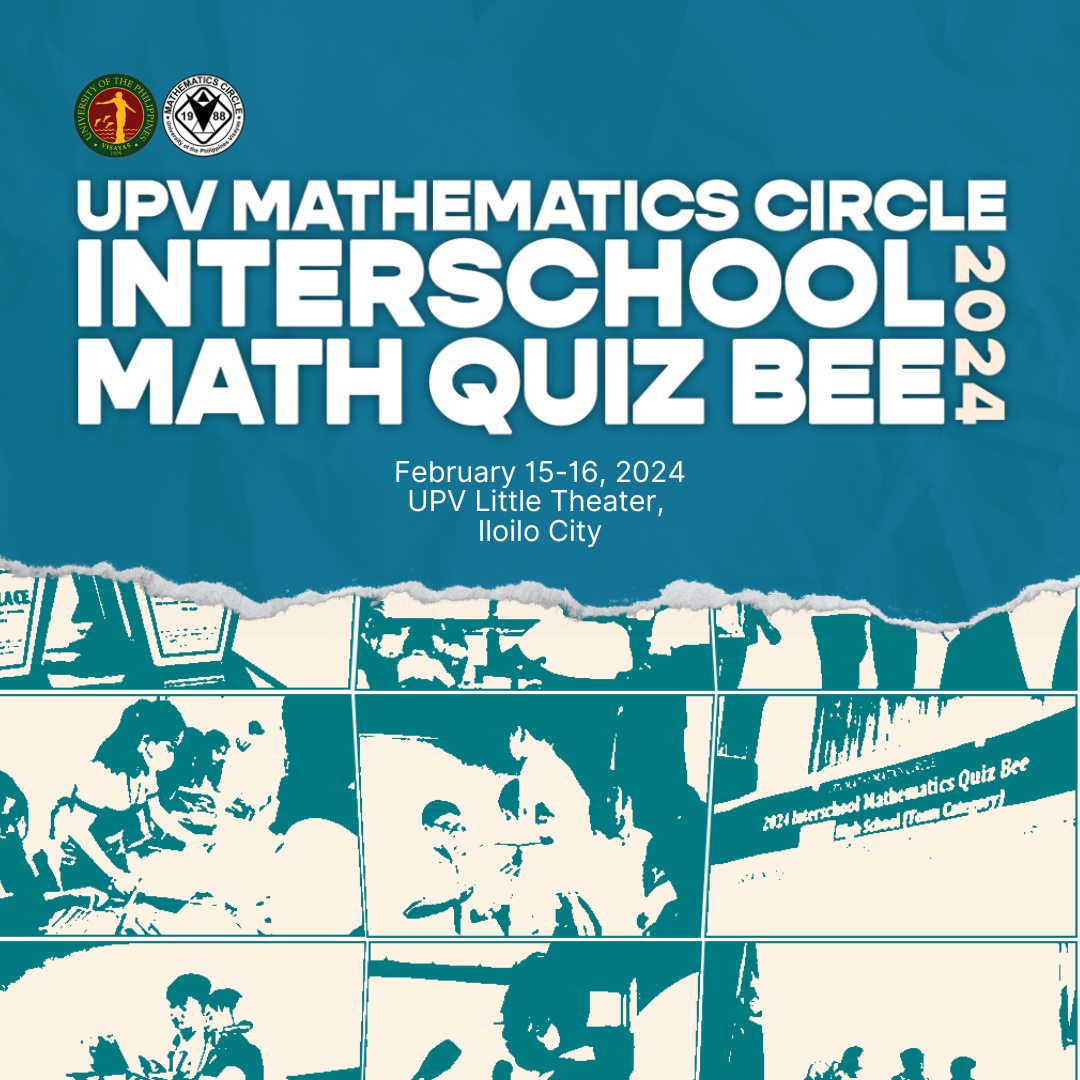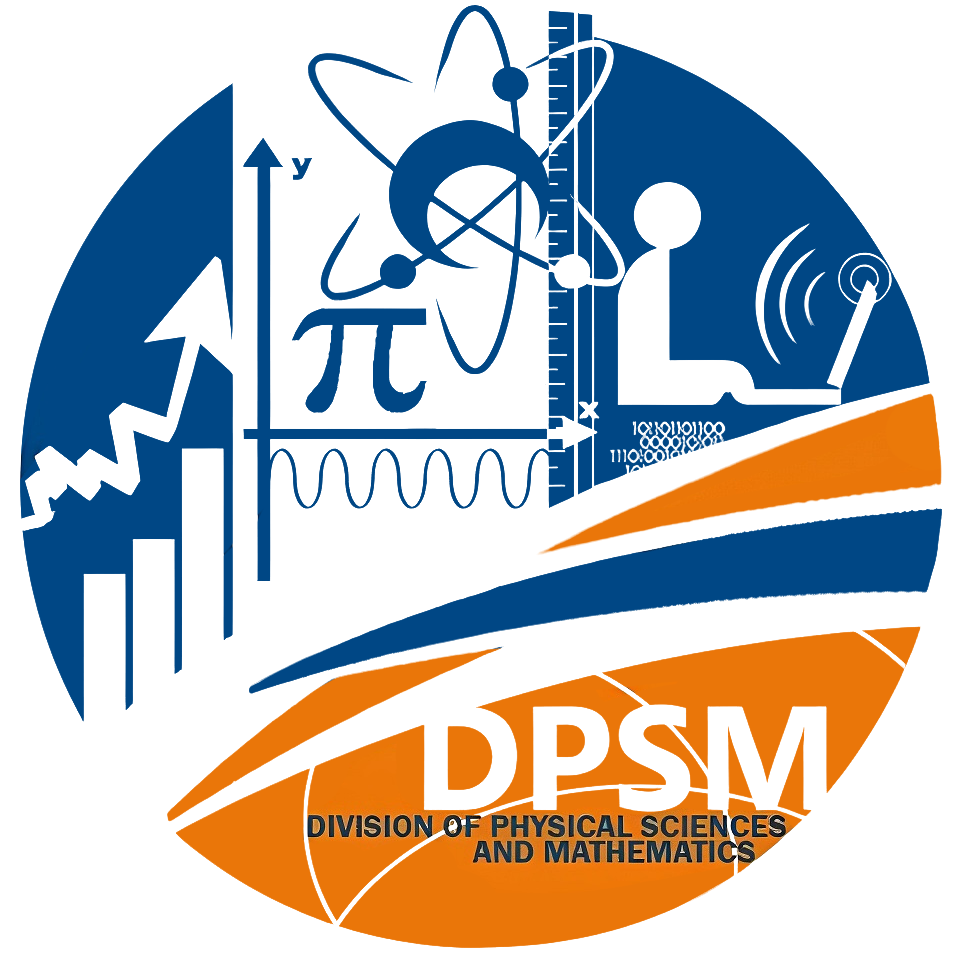Instituted in 1988, the Bachelor of Science in Applied Mathematics (BSAM) program of the Division of Physical Sciences and Mathematics (DPSM) aims to equip students with the necessary knowledge and skills that will enable them to pursue advanced studies in pure and applied mathematics and to provide them with adequate training in preparation for teaching secondary and tertiary-level mathematics courses and for mathematics-oriented careers in the industry.
The program is one of the non-quota courses offered in the University of the Philippines Visayas. Although BS Applied Mathematics is one of the non-quota courses, (i.e. there's no limit in the number of accepted freshman students into the course), the program accepts 30-35 incoming freshmen per academic year.
The graduates of the B.S. in Applied Mathematics program should be able to:
- demonstrate the depths of concepts and theories of mathematics in their area of specialization.
- demonstrate independence, competence and willingness to learn new ideas.
- identify developmental issues and examines probable solutions to these issues.
- communicate clearly and confidently and share effectively ideas and solutions to issues.
- analyze issues/ situations and articulate concrete solution to them.
- demonstrate confidence, determination and open-mindedness to change, and respond to others' suggestions with creativity and innovation.
- demonstrate enthusiasm, leadership and the ability to positively influence and work harmoniously with others.
- respond actively to social and environmental issues.
- fulfill his/her professional and ethical responsibilities.
- fulfill his/her duties as a Filipino with a strong sense of willingness to serve the country.
BS in Applied Mathematics is a 4-year undergraduate program consisting of 141 units.
| Curriculum Structure | Units |
|---|---|
| General Education (GE) Required Courses | 21 |
| General Education Elective Courses | 15 |
| Foundation Courses | 28 |
| Core Courses | 53 |
| Mathematics Elective Courses | 9 |
| Qualified Elective Courses | 6 |
| Free Elective Courses | 6 |
| Legal Requirements (PI 100) | 3 |
| Other Requirements (PE, NSTP) | 14 |
| Total | 141 |
| Program Structure | ||||
| Courses | Title | Credits | Prerequisites | |
|---|---|---|---|---|
| First Year - First Semester | ||||
| GE Core 1 | 3 | |||
| GE Core 2 | 3 | |||
| Econ 11 | Introductory Economics | 3 | ||
| Math 18 | Precalculus Mathematics | 5 | ||
| Math 153 | Computer Programming I | 3 | ||
| PE 1 | Foundation of Physical Fitness | (2) | ||
| NSTP | (5) | |||
| Total: 17 | ||||
| First Year - Second Semester | ||||
| GE Core 3 | 3 | |||
| Math 53 | Calculus I | 4 | Math 18 | |
| Math 107 | Logic and Set Theory | 3 | Math 18 | |
| Math 154 | Computer Programming II | 3 | Math 153 | |
| Physics 71 | Elementary Physics I | 4 | Math 18 & Co-req: Math 53 | |
| Physics 71.1 | Elementary Physics Laboratory I | 1 | Co-req: Physics 71 | |
| PE | (2) | |||
| NSTP | (3) | |||
| Total: 18 | ||||
| Second Year - First Semester | ||||
| GE Core 4 | 3 | |||
| Math 54 | Calculus II | 4 | Math 53 | |
| Math 110 | Abstract Algebra | 3 | Math 107 | |
| Math 114 | Linear Algebra | 3 | Math 107 | |
| Math 135 | Combinatorial Mathematics | 3 | Math 107 | |
| PE | (3) | |||
| Total: 16 | ||||
| Second Year - Second Semester | ||||
| GE Core 5 | 3 | |||
| GE Elective 1 | 3 | |||
| Math 55 | Calculus III | 4 | Math 54 | |
| Math 121 | Elementary Differential Equations | 3 | Coreq: Math 55 | |
| Math 162 | Theory of Interest | 3 | Math 54 | |
| Math 173 | Numerical Methods I | 3 | Math 54, Math 114, Math 154 | |
| PE | (2) | |||
| Total: 19 | ||||
| Third Year - First Semester | ||||
| GE Core 6 | 3 | |||
| GE Elective 2 | 3 | |||
| Math 174 | Numerical Methods II | 3 | Math 55, Math 121, Math 173 | |
| Math 183 | Linear and Integer Programming | 3 | Math 114 | |
| Stat 110 | Non-Bayesian Probability | 4 | Math 54 or equivalent | |
| Math Elective 1 | 3 | |||
| Total: 19 | ||||
| Third Year - Second Semester | ||||
| GE Core 7 | 3 | |||
| Comm 12 | Technical Communication | 3 | Comm 10 | |
| Math 175 | Mathematical Modeling | 3 | Math 174 | |
| Stat 111 | Statistical Methods & Inference | 4 | Stat 110 | |
| Math Elective 2 | 3 | |||
| Total: 16 | ||||
| Midyear | ||||
| Math 195 | Practicum | 3 | Must have taken at least 30 units of upper division courses | |
| Total: 3 | ||||
| Fourth Year - First Semester | ||||
| GE Elective 3 | 3 | |||
| GE Elective 4 | 3 | |||
| Math 123 | Advanced Calculus I | 3 | Math 55 or equivalent | |
| Math 198.1 | Special Problem I | 1 | Math 135, Math 162, Math 175, Math 183, Comm 12 | |
| Qualified Elective 1 | 3 | |||
| Elective | 3 | |||
| Total: 16 | ||||
| Fourth Year - Second Semester | ||||
| GE Elective 5 | 3 | |||
| PI 100 | The Life and Works of Jose Rizal | 3 | Senior Standing | |
| Math 128 | Complex Analysis I | 3 | Math 55 or equivalent | |
| Math 198.2 | Special Problem II | 2 | Math 198.2 | |
| Qualified Elective 2 | 3 | |||
| Elective | 3 | |||
| Total: 17 | ||||
| Electives | ||||
| Math 116 | Number Theory | Math 107, Junior Standing | ||
| Math 122 | Dynamical Systems | Math 121 | ||
| Math 125 | Introduction to Mathematical Biology | Math 114, Math 121 | ||
| Math 140 | Graph Theory and Its Applications | Math 107 | ||
| Math 143 | Modern Geometries and Their Applications | Math 110, Math 114 | ||
| Math 146 | Introduction to Topology | Math 55, Math 107 | ||
| Math 165 | Financial Derivatives Markets | Math 162 | ||
| Math 178 | Mathematical Methods in Economics | Math 55, Math 114 | ||
| Math 184 | Network Analysis and Dynamic Programming | Math 121, Econ 11, Math 183 | ||
| Math 185 | Planar Location and Facility Theory | Math 183 | ||
| Math 186 | Nonlinear Optimization | Math 183 | ||
| Math 195 | Practicum | Must have taken at least 30 units of upper division courses, Consent of Instructor | ||
| Math 197 | Special Topics in Mathematics (Possible topics: multi-objective optimization, stochastic optimization, convex optimization, calculus of variations, partial differential equations, game theory, coding theory, mathematical crystallography, differential geometry, spectral methods, mathematics of life contingencies, stochastic calculus for finance, and other topics from the emerging areas of applied mathematics.) | |||
| Stat 104 | Descriptive Statistics | None | ||
| Stat 129 | Regression and Correlation Analysis | Math 114, Stat 123 | ||
| Stat 130 | Introduction to Experimental Designs | Stat 129 | ||
| Stat 133 | Introduction to Exploratory Data Analysis | Stat 123 | ||
| Stat 138 | Use of Statistical Software Packages | Stat 104, Math 153 | ||
| Stat 140 | Introduction to Sample Surveys | Stat 123 | ||
| Stat 145 | Introduction to Time Series Analysis and Forecasting | Stat 129 | ||
| Stat 149 | Introduction to Categorical Data Analysis | Stat 129 | ||
| Stat 150 | Survey Operations | Stat 140, Stat 138 | ||
| Stat 171 | Elementary Economic Statistics | Coreq: Stat 129 | ||
| Stat 172 | Statistical Methods in Fisheries and Agriculture | Stat 123 | ||
| Stat 173 | Elementary Actuarial Statistics | Consent of Instructor | ||
| Stat 174 | Elementary Statistical Quality Control | Stat 123 | ||
| Stat 175 | Introduction to Biostatics | Stat 129 | ||
| Stat 176 | Statistical Procedures in Market Research | Stat 123 | ||
| Stat 179 | Introduction to Survival Analysis | Stat 129 | ||
| Stat 180 | Introduction to Stochastic Processes | Stat 122, Math 121 | ||
| Stat 197 | Special Topics in Statistics | Consent of Instructor | ||
| CMSC 56 | Discrete Mathematical Structures in Computer Science 1 | None | ||
| CMSC 57 | Discrete Mathematical Structures in Computer Science 2 | CMSC 56 | ||
| CMSC 123 | Data Structures | CMSC 21, CMSC 57 | ||
| CMSC 140 | Advanced Programming | CMSC 21, CMSC 57 | ||
| CMSC 141 | Automata and Language Theory | CMSC 57 | ||
| CMSC 142 | Design and Analysis of Algorithms | CMSC 123 | ||
| CMSC 143 | Advanced Algorithms | CMSC 142 | ||
| CMSC 153 | Accounting and Information Systems | CMSC 21 | ||
| CMSC 161 | Interactive Computer Graphics | CMSC 57, CMSC 123 | ||
| CMSC 162 | 3D Computer Graphics and Animation | CMSC 123 | ||
| CMSC 170 | Introduction to Artificial Intelligence | CMSC 123 | ||
| CMSC 173 | Data Mining | CMSC 123, Stat 106 or COI (for non-majors) | ||
| CMSC 180 | Computer Simulation and Modeling | CMSC 123 | ||
| CMSC 181 | Introduction to Parallel Computing | CMSC 123 | ||
| CMSC 182 | Scientific Computing | CMSC 11, CMSC 57, and Math 53 | ||
| CMSC 197 | Special Topics | Consent of Instructor | ||
| Physics 72 | Elementary Physics II | Prereq: Physics 71, Coreq: Math 54 | ||
| Physics 72.1 | Elementary Physics Laboratory II | Prereq: Physics 71.1, Coreq: Physics 72 | ||


